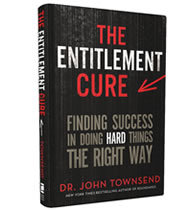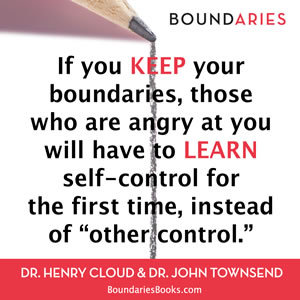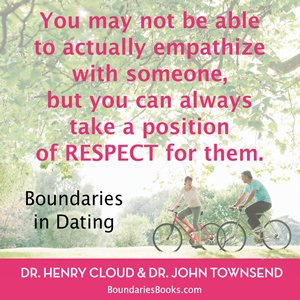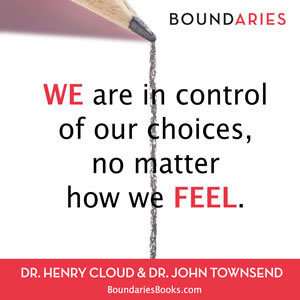Henry Cloud's Blog, page 21
August 20, 2015
The Cure for the Disease of Entitlement
 Entitlement is the belief that I am exempt from responsibility and I am owed special treatment. Entitlement is: The man who thinks he is above all the rules. The woman who feels mistreated and needs others to make it up to her.
Entitlement is the belief that I am exempt from responsibility and I am owed special treatment. Entitlement is: The man who thinks he is above all the rules. The woman who feels mistreated and needs others to make it up to her.
I need you to understand the concept of entitlement thoroughly, so that you can recognize it and help others get past it. It is not always easy to understand. Entitlement is not the person who has needs or struggles that she cannot deal with on her own. She is in need. Chronically ill individuals and disabled veterans often are in great need of help, and we need to help them. Entitlement is the person who is capable of taking care of himself and still expects others to do that for him, because he feels he is owed that. This includes the able-bodied adult child who continues to live with his parents, refusing to work, to contribute to the home’s upkeep, or even to clean up after himself. It can also include the worker who takes advantage of disability benefits after she has recovered.
There is a solution to entitlement, which I call the Hard Way. The Hard Way is the entitlement cure. It is a path of behaviors and attitudes that undo the negative effects of entitlement, whether in ourselves or in others.
Here’s my definition of the Hard Way: The habit of doing what is best, rather than what is comfortable, to achieve a worthwhile outcome.
When you deem something worthwhile, be it a career or financial dream, a great family or marriage or some self-care goal, you have two ways to go about it. Entitlement directs you to give the minimum, find the shortcut, and think only of yourself. The Hard Way takes the opposite tack. This habit focuses on doing whatever is best to reach the good goal, even if it is difficult, uncomfortable, takes longer, and requires more energy.
Does that sound hard? Yes, it does, because yes, it is. It’s hard to wake up early in the morning and work out. It’s hard to get to work on time. It’s hard to spend hours a day inputting data when you are a creative person. It’s hard to think creatively when you are more linear. It’s hard to have difficult conversations, to face down tough challenges, and to do the same actions, over and over again, that are required to achieve success. As the saying goes, it’s called work for a reason. But it pays off, just as good sowing leads to good reaping.
Are you hearing biblical echoes in this language? That’s because this is a highly scriptural concept: “Enter through the narrow gate. For wide is the gate and broad is the road that leads to destruction, and many enter through it. But small is the gate and narrow the road that leads to life, and only a few find it” (Matthew 7:13 – 14).
If you have a difficult relationship with an entitled person or group, or even if you have discovered entitlement in yourself, understand this: It doesn’t have to stay this way. The Hard Way principles work. I have used them in many, many situations and relationships. The steps are both practical and effective. If your entitled person has little interest in changing, then you of course can’t force them to change — but you will find help here to enable you to deal with the situation.
God originated the Hard Way, and he lives it. All through the Bible, he does the best thing, even if it is a difficult thing. He never avoids it. The best example of this is Jesus, who suffered and died for no other reason than his love for a world that didn’t want him: “Because the Sovereign Lord helps me, I will not be disgraced. Therefore have I set my face like f lint, and I know I will not be put to shame” (Isaiah 50:7). Setting his face like f lint, Jesus faced a way harder than any of the rest of us have ever had to face and created a path for us all to be redeemed and to live.
Ultimately, the Hard Way is simply God’s Way. It is how he runs the world, expresses his own values, and makes choices that affect us. You might even call it the righteous path, for it is the right and good way to live: “Thus you will walk in the ways of the good and keep to the paths of the righteous” (Proverbs 2:20). God’s ways will never fail you, even when they make you uncomfortable for a while.
______
 Taken from The Entitlement Cure by Dr. John Townsend. Visit EntitlementCure.com to learn more and see how you can get a FREE ebook when you order today.
Taken from The Entitlement Cure by Dr. John Townsend. Visit EntitlementCure.com to learn more and see how you can get a FREE ebook when you order today.
The post The Cure for the Disease of Entitlement appeared first on Boundaries Books.
August 12, 2015
Boundaries and Your Brain at Work
 Remember the old saying “Come on, this is not brain surgery”? It was meant to convey the simplicity of an answer or a concept, and often meant to prod people to get off their butts and do what is obvious. That is how it is with a leader’s boundaries. It is profoundly simple. You do not have to be a brain surgeon to establish the boundaries that are usually made by a great leader.
Remember the old saying “Come on, this is not brain surgery”? It was meant to convey the simplicity of an answer or a concept, and often meant to prod people to get off their butts and do what is obvious. That is how it is with a leader’s boundaries. It is profoundly simple. You do not have to be a brain surgeon to establish the boundaries that are usually made by a great leader.
But at the same time, underneath it all, it really is brain surgery, because the reason that a leader’s boundaries work is that they actually make it possible for people’s brains to function as they were designed. Said another way, if you are trying to lead people and do not establish effective boundaries, your people will not be able to do what you need and want them to do because their brains can’t work that way. You will build an organization full of geniuses who are producing brain-impaired results.
Why is that? Just like a computer, the brain operates according to certain processes that are hardwired or encoded in the system. Ignore the operating instructions, and the brain flounders. But as a leader, if you understand how the brain works and what will make it function optimally, you can create the right conditions to help your people be at their best, and when they’re at their best, the organization thrives and positive results stream in. Show me a person, a team, or a company that gets results, and I will show you the leadership boundaries that make it possible.
So, let’s get specific. What are these brain processes that the leader’s boundaries enable to work? Neuroscience has shown that when these processes are cultivated and protected—which is exactly what strong boundaries provide—good things happen. Let’s start by looking at what brain scientists call the “executive functions” of the brain.
In brain terminology, executive functions are needed to achieve any kind of purposeful activity—such as reaching a goal, driving a vision forward, or conquering an objective. The brain relies on three essential processes:
a. Attention: the ability to focus on relevant stimuli, and block out what is not relevant: “Pay attention!”
b. Inhibition: the ability to “not do” certain actions that could be distracting, irrelevant, or even destructive: “Don’t do that!”
c. Working Memory: the ability to retain and access relevant information for reasoning, decision making, and taking future actions: “Remember and build on relevant information.”
In other words, our brains need to be able to: (a) focus on something specific, (b) not get off track by focusing on or being assaulted by other data inputs or toxicity, and (c) continuously be aware of relevant information at all times.
Here is a little more brain science for you. When those three processes of the brain are activated, results happen because they enable the next level of the brain’s executive capacities, which are the ones you really want to have activated in your organization. It’s the brain on steroids, so to speak. If executive functions of the brain are working well, and people are structured enough to focus, inhibit, and be conscious of what is important, they can execute the following list of behaviors, which actually are involved in producing results:
Goal Selection
Planning and Organization
Initiation and Persistence
Flexibility
Execution and Goal Attainment
Self-regulation:
If you look at this list, it is not a leap to see your team or organization becoming one big brain, figuring out what is important, what is not, and getting it done through goals, plans, persistence, adaptability, flexibility, execution, and good self-management.
_______
 Discover more ground-breaking principles to transform your leadership and workplace culture from Dr. Henry Cloud with Boundaries for Leaders.
Discover more ground-breaking principles to transform your leadership and workplace culture from Dr. Henry Cloud with Boundaries for Leaders.
Image courtesy of Master isolated images / FreeDigitalPhotos.net
The post Boundaries and Your Brain at Work appeared first on Boundaries Books.
August 5, 2015
The Desire to Reconnect Doesn’t Mean You’re Crazy
 When my sons (Dr. Townsend) were small, they often argued and fought. Their disagreements erupted for any number of reasons, and sometimes, the best strategy seemed to be to separate them for a period of time. When it appeared that they had learned a lesson and could once again play well, I let them get together again.
When my sons (Dr. Townsend) were small, they often argued and fought. Their disagreements erupted for any number of reasons, and sometimes, the best strategy seemed to be to separate them for a period of time. When it appeared that they had learned a lesson and could once again play well, I let them get together again.
For the situations in which there was a bad guy and I separated them, it would seem to make sense that the hurt brother would have had enough of his offending brother. You would expect that the mean one would want to reconnect and reconcile sooner than the hurt one. But that was not the pattern; there was no pattern. Both boys always wanted to get back together and play after approximately the same amount of time had passed.
No matter who was the perpetrator and who the victim, the cooling-off period for each was similar. My best understanding of this is simply that their attachment trumped their desire to be away from each other. After a timeout, the desire to be together was stronger than their anger and fear.
This dynamic doesn’t apply just to my sons or even just to kids. It applies to all of us. Understanding the return of desire — the drive to reconnect — is key to learning what happens when you set boundaries.
When you set a boundary in a relationship, you create space, room, between you and another person. In healthy connections, the space simply defines you and the other person as two distinct individuals with different minds and opinions, but who still benefit from being connected to each other.
However, when you have to set protective boundaries with someone, the space you create between you is about guarding yourself from something not good for you: control or manipulation, for example. And the nature of the space can range from something minor, such as choosing to not talk about certain topics, to something major, such as moving out of your home or even permanently leaving the relationship.
Creating space has an obvious consequence for the other person, but it also has an impact on you. It can actually increase your desire and interest in a relationship, either the one you are working on, or a new one altogether. This is ironic, because when you have had a rough go of it with someone, you might think that the last thing you need is any kind of desire for another relationship: Give me space! And, while that is a common feeling at the beginning of the boundary period, it does not last forever. The space is a vacuum, and the vacuum puts your in touch with your God-given desire to connect.
Here is the point: wanting someone doesn’t mean you are crazy for having the desire, nor that the time is necessarily right to connect or reconnect with a person. It is simply a sign that you are alive inside and that the boundary has given you breathing room to feel your human need for connection. Pay attention to it, be glad you are alive, and use good judgment and good people to help you decide what to do with it.
__________
Discover when and how to trust again after you’ve set appropriate boundaries, how to connect deeply without being hurt, and how to safely grow your most intimate relationships in Beyond Boundaries by Dr. John Townsend.
The post The Desire to Reconnect Doesn’t Mean You’re Crazy appeared first on Boundaries Books.
July 29, 2015
Is Your Family Holding You Back?
 When some individuals begin to develop boundaries, they say, “But my mother (or father, or sister, or brother) is my best friend.” They often feel fortunate that, in times of family stress, their best friends are the family in which they were raised. They don’t think they need an intimate circle of friends besides their own parents and siblings.
When some individuals begin to develop boundaries, they say, “But my mother (or father, or sister, or brother) is my best friend.” They often feel fortunate that, in times of family stress, their best friends are the family in which they were raised. They don’t think they need an intimate circle of friends besides their own parents and siblings.
They misunderstand the biblical function of the family. God intended the family to be an incubator in which we grow the maturity, tools, and abilities we need. Once the incubator has done its job, it’s supposed to encourage the young adult to leave the nest, connect to the outside world (see Genesis 2:24), and establish a spiritual and emotional family system on one’s own. The adult is free to do whatever God has designed for him or her.
Over time, we are to accomplish God’s purposes of spreading his love to the world, to make disciples of all the nations (see Matthew 28:19–20). Staying emotionally locked in to the family of origin frustrates this purpose. It’s hard to see how we’ll change the world when we live on the same street.
No one can become a truly biblical adult without setting some limits, leaving home, and cleaving somewhere else. Otherwise, we never know if we have forged our own values, beliefs, and convictions—our very identity—or if we are mimicking the ideas of our family.
Can family be friends? Absolutely. But if you have never questioned, set boundaries, or experienced conflict with your family members, you may not have an adult-to-adult connection with your family. If you have no other “best friends” than your family, you need to take a close look at those relationships. You may be afraid of separating, individuating, and becoming an autonomous adult.
________
 Does learning to set boundaries by yourself feel like a daunting task? Don’t do it alone. Learn to develop limits in a group setting that is supportive and encouraging. Use the Boundaries DVD Video Study with a small group and learn the power of boundaries together.
Does learning to set boundaries by yourself feel like a daunting task? Don’t do it alone. Learn to develop limits in a group setting that is supportive and encouraging. Use the Boundaries DVD Video Study with a small group and learn the power of boundaries together.
Click here to watch a sample video and purchase.
The post Is Your Family Holding You Back? appeared first on Boundaries Books.
July 23, 2015
How Loving Parents End Up With Selfish Kids
 Sometimes the most loving parents end up with the most selfish children. How can that be? We have all heard people say things like, “You know how Susan is. She only thinks of herself.” And many times, Susan comes from a nice family. But Susan’s parents did not set boundaries that required her to respect the feelings of others. This lack of boundaries led to egocentrism, which affected Susan’s ability to love. Having no boundaries in childhood can also lead to impulse problems, addictions, or irresponsibility, which is always unloving.
Sometimes the most loving parents end up with the most selfish children. How can that be? We have all heard people say things like, “You know how Susan is. She only thinks of herself.” And many times, Susan comes from a nice family. But Susan’s parents did not set boundaries that required her to respect the feelings of others. This lack of boundaries led to egocentrism, which affected Susan’s ability to love. Having no boundaries in childhood can also lead to impulse problems, addictions, or irresponsibility, which is always unloving.
George sat in my (Dr. Cloud’s) office, despondent. His wife, Janet, whom he loved deeply, had just moved out because he had lost another job. A very talented person, George seemed to have everything he needed for success. But he had lost several good jobs because of his irresponsibility and inability to follow through. Bosses loved the talent but hated the performance. And after several family disruptions because of his failures, Janet had had enough.
“I love her so much,” George said to me. “Doesn’t she see that?”
“I believe that you love her,” I said. “But in reality, I don’t think that she does see your love. All she sees is the effect your behavior has had on her and the children, and she asks herself, ‘How can he love us and treat us this way?’ You cannot just love someone and not deliver. Love without the fruits of love is really not love in the end. She feels very unloved because of what you have put her through.”
If George was to have a chance of winning Janet back, it would not come through one more empty promise. He needed to develop boundaries to gain the self-control that would make him a responsible person. Janet was only going to believe in action, not just talk about love.
George had never been required to deliver the fruits of love when growing up. His parents were fine, hardworking people. But having gone through the Depression and a lifetime of hard work, they did not want George to have to struggle as they had.
As a result, they indulged him and required very little work from him. When they did give him chores and responsibilities and he did not deliver, they would not discipline him, thinking that they wanted him to have “positive self-esteem” rather than the “guilt” with which they grew up. Consequently, he did not see any negative effect on his loved ones when he did not perform.
But marriage was different. He was now in a relationship in which the one he loved also had requirements for him, and things were falling apart. For George to become a truly loving person, one whose love actually made a difference in the lives of others, he was going to have to become a responsible person. In the end, love is as love does.
Loving people respect the boundaries of others. Have you ever been in a relationship with a person who could not hear the word no? How did you feel? Typically one feels controlled, manipulated, and resentful instead of respected and loved. A controlling person steps over the line and tries to possess the other. This does not feel very loving, no matter how much the offender says he cares.
Loving people are able to control their impulses. Many alcoholics, for example, have great love for their families. Their drinking greatly troubles them, and they feel horrendous guilt. But still they drink, and although, like George, they love, the effects of their lack of ability to say no to alcohol ends up destroying the relationships they care about. Many other impulse problems—such as sexual acting out, overspending, food or drug abuse, and rage attacks—end up destroying love as well. A lack of boundaries keeps these behaviors going, which reveals how “loving” parents can wind up with selfish kids.
_______
Learn more about how to instill the kind of character in your children that will help them lead balanced, productive, and fulfilling lives in Boundaries with Kids.
The post How Loving Parents End Up With Selfish Kids appeared first on Boundaries Books.
July 14, 2015
When Someone Responds to Your Boundaries with Anger
 When you establish a new boundary with someone else, the most common form of resistance one gets is anger. People who get angry at others for setting boundaries have a character problem. Self-centered, they think the world exists for them and their comfort. They see others as extensions of themselves.
When you establish a new boundary with someone else, the most common form of resistance one gets is anger. People who get angry at others for setting boundaries have a character problem. Self-centered, they think the world exists for them and their comfort. They see others as extensions of themselves.
When they hear the word “no,” they have the same reaction a two-year-old has when deprived of something: “Bad Mommy!” They feel as though the one who deprives them of their wishes is “bad,” and they become angry. They are not righteously angry at a real offense. Nothing has been done “to them” at all. Someone will not do something “for them.” Their wish is being frustrated, and they get angry because they have not learned to delay gratification or to respect others’ freedom.
The angry person has a character problem. If you reinforce this character problem, it will return tomorrow and the next day in other situations. It is not the situation that’s making the person angry, but the feeling that they are entitled to things from others. They want to control others and, as a result, they have no control over themselves. So, when they lose their wished-for control over someone, they “lose it.” They get angry. Here are six steps to consider when someone responds with anger:
1. Realize that the person who is angry at you for setting boundaries is the one with the problem. If you do not realize this, you may think you have a problem. Maintaining your boundaries is good for other people; it will help them learn what their families of origin did not teach them: to respect other people.
2. View anger realistically. Anger is only a feeling inside the other person. It cannot jump across the room and hurt you. It cannot “get inside” you unless you allow it. Staying separate from another’s anger is vitally important. Let the anger be in the other person. He will have to feel his anger to get better. If you either rescue him from it, or take it on yourself, the angry person will not get better and you will be in bondage.
3. Do not let anger be a cue for you to do something. People without boundaries respond automatically to the anger of others. They rescue, seek approval, or get angry themselves. There is great power in inactivity. Do not let an out-of-control person be the cue for you to change your course. Just allow him to be angry and decide for yourself what you need to do.
4. Make sure you have your support system in place. If you are going to set some limits with a person who has controlled you with anger, talk to the people in your support system first and make a plan. Know what you will say. Anticipate what the angry person will say, and plan your reaction. You may even want to role-play the situation with your group. Then, make sure your support group will be available to you right after the confrontation. Perhaps some members of your support group can go with you. But certainly you will need them afterward to keep you from crumbling under the pressure.
5. Do not allow the angry person to get you angry. Keep a loving stance while “speaking the truth in love.” When we get caught up in the “eye for eye” mentality of the law, or the “returning evil for evil” mentality of the world, we will be in bondage. If we have boundaries, we will be separate enough to love.
6. Be prepared to use physical distance and other limits that enforce consequences. One woman’s life was changed when she realized that she could say, “I will not allow myself to be yelled at. I will go into the other room until you decide you can talk about this without attacking me. When you can do that, I will talk to you.”
These serious steps do not need to be taken with anger. You can empathize lovingly and stay in the conversation, without giving in or being controlled. “I understand that you are upset that I will not do that for you. I am sorry you feel that way. How can I help?” Just remember that when you empathize, changing your no will not help. Offer other options.
If you keep your boundaries, those who are angry at you will have to learn self-control for the first time, instead of “other control,” which has been destructive to them anyway. When they no longer have control over you, they will find a different way to relate. But, as long as they can control you with their anger, they will not change.
Sometimes, the hard truth is that they will not talk to you anymore, or they will leave the relationship if they can no longer control you. This is a true risk. God takes this risk every day. He says that he will only do things the right way and that he will not participate in evil. And when people choose their own ways, he lets them go. Sometimes we have to do the same.
_________
Learn more about setting healthy boundaries that last in the New York Times bestselling book, Boundaries.
The post When Someone Responds to Your Boundaries with Anger appeared first on Boundaries Books.
July 8, 2015
Say “Yes” to Respect in Dating
 Respect is a necessary element for any couple to grow in love. Each person needs to feel that they are respected by the person they are getting to know. This involves creating boundaries in dating where both parties have esteem or regard for all aspects of the other. Respect is different from empathy, though any relationship needs both to be hand-in-hand.
Respect is a necessary element for any couple to grow in love. Each person needs to feel that they are respected by the person they are getting to know. This involves creating boundaries in dating where both parties have esteem or regard for all aspects of the other. Respect is different from empathy, though any relationship needs both to be hand-in-hand.
Empathy is the ability to feel another’s experience, especially painful ones. Respect is the ability to value another’s experience. You may not be able to actually empathize with someone, but you can always take a position of respect for them. For example, a guy may restrain himself from pushing his girlfriend sexually for either reason. He may feel deep compassion for the dilemma he is putting her in. Or he may restrain himself because he respects her right to make her own moral decisions. Relationships develop best when both empathy and respect are in place.
When respect is present, the other person feels that he can be free to be who he is. He can be honest, and still feel connected and safe. He doesn’t worry that he will be attacked, humiliated, or treated poorly. When respect is absent, many people will find themselves controlled, neglected, or injured by someone who doesn’t care about their needs or feelings.
If you desire to be respected, you are not asking to be treated special. Respect is not worship. It has more to do with being treated as you would like to be treated, which is Jesus’ Golden Rule (see Matthew 7:12). It means things like the following:
Your opinion is heard and valued.
Your differences and disagreeing are validated.
Your choices are esteemed, even the wrong ones.
Your feelings are regarded.
When you are wrong, you are confronted respectfully, not talked down to nor babied.
Disrespect flourishes when someone values their own desires above their date’s. They may not be actively trying to hurt the other. Instead, the other person’s feelings, freedom, or needs get trampled or ignored because of how intent their date is on having their own way. Disrespect tends to be more self-centered than malicious in nature, though that does occur also.
Building boundaries in dating situations means that a couple needs to know that their feelings, needs, and freedom are respected. When someone is uncomfortable in a sexual situation, or is hurt by a sarcastic remark, or becomes angry with a broken promise, that is a signal that something is going on. The other person needs to take those feelings seriously. The couple needs to talk about what triggered this, and solve the problem.
Disrespect may come out in several ways, and it usually involves some violation of freedom in one of seven ways:
1. Dominating: The other person won’t hear “no” from her date. When he disagrees, she intimidates, threatens, or rages. She is offended by her date’s freedom to choose. For example, a woman may want her boyfriend to spend lots of time with her. When he tells her he’d prefer to do other things, she may disrespect his freedom by becoming angry and telling him their relationship will be jeopardized.
2. Withdrawal: One person pulls away when the other exercises some freedom or difference. He may isolate, sulk, or be silent. But he is passively punishing his date for her differentness. For example, a woman might want to go out with the girls on a night that her boyfriend wants to be with her. While he doesn’t complain, he also doesn’t call or talk to her for a while. He is showing her that he doesn’t respect her freedom.
3. Manipulating: One person shows disrespect by subtle stratagems designed to make the other person change his mind. A woman may cry or nag to get her boyfriend to help her paint her apartment when he doesn’t have the time.
4. Direct violation: The person disrespects by continuing the same hurtful action, even after being asked not to. A man might chronically cancel dates at the last moment. Even though she tells him how much this bothers her, he keeps doing it.
5. Minimizing: One person says the other person’s negative feelings are simply an overreaction.
6. Blaming: A man talks about a problem, but the woman indicates that he himself caused the problem. For example, a man will tell his girlfriend that it hurts when she makes fun of him in public. She might respond with, “If you would pay more attention to me, I wouldn’t have to resort to that.”
7. Rationalizing: The other person denies responsibility for whatever caused the problem. For example, the chronically late date excuses the hurt his girlfriend feels by saying, “I understand your feelings, but it was the freeway traffic, not me.”
Respecting someone doesn’t mean that you agree with them. Nor does it mean that you will comply with what they want. It means that their feelings matter because those emotions belong to a person who matters. Listen to, understand, and try to help the situation.
If your feelings, time, opinion, or values are not being respected, you need to take some sort of action. You may need to end your silence and bring up the issue. You may need to bring it up as a serious issue, not to be put off. You may need to set consequences on the event happening again. That’s what boundaries in dating is all about.
I knew a woman whose date was always having fun at her expense when they went out with friends. Finally, she started driving a separate car to the events so that she could leave when he got disrespectful. It took only a few occurrences of this for him to see that she was serious, and things got better.
 Ready for more helpful advice about how to build the best dating relationship and find the love of your life? Check out Boundaries in Dating.
Ready for more helpful advice about how to build the best dating relationship and find the love of your life? Check out Boundaries in Dating.
The post Say “Yes” to Respect in Dating appeared first on Boundaries Books.
July 2, 2015
You Are In Control of Your Choices
 Any time is a great time to take stock of boundaries in our lives and renew the desire to take responsibility for our choices. This leads to the fruit of “self-control.” A common boundary problem is disowning our choices and trying to lay the responsibility for them on someone else.
Any time is a great time to take stock of boundaries in our lives and renew the desire to take responsibility for our choices. This leads to the fruit of “self-control.” A common boundary problem is disowning our choices and trying to lay the responsibility for them on someone else.
Think for a moment how often we use the phrases, “I had to” or “She (he) made me” when explaining why we did or did not do something. These phrases betray our basic illusion that we are not active agents in many of our dealings. We think someone else is in control, thus relieving us of our basic responsibility.
We need to realize that we are in control of our choices, no matter how we feel. This keeps us from making choices to give “reluctantly or under compulsion,” as 2 Corinthians 9:7 says. Paul would not even accept a gift that he felt was given because the giver felt he “had to” give it. He once sent a gift back so “that any favor you do will be spontaneous and not forced” (see Philemon 1:14).
Jesus said a similar thing to the worker who was angry about the wage for which he had agreed to work: “Friend, I am not being unfair to you. Didn’t you agree to work for a denarius?” (Matthew 20:13). The man had made a free choice to work for a certain amount and was angry because someone who had worked fewer hours had gotten the same wage.
Throughout the Scriptures, people are reminded of their choices and asked to take responsibility for them. Like Paul says, if we choose to live by the Spirit, we will live; if we choose to follow our sinful nature, we will die (Romans 8:13). Making decisions based on others’ approval or on guilt breeds resentment, a product of our sinful nature. We have been so trained by others on what we “should” do that we think we are being loving when we do things out of compulsion.
Setting boundaries inevitably involves taking responsibility for your choices. You are the one who makes them. You are the one who must live with their consequences. And you are the one who may be keeping yourself from making the choices you could be happy with.
 With over 2 million copies sold, Boundaries is the one book that can radically change your life in the next year! Read this New York Times bestseller for the first time or re-read it to renew the power of boundaries in all of your relationships.
With over 2 million copies sold, Boundaries is the one book that can radically change your life in the next year! Read this New York Times bestseller for the first time or re-read it to renew the power of boundaries in all of your relationships.
Image courtesy of Vlado at FreeDigitalPhotos.net
The post You Are In Control of Your Choices appeared first on Boundaries Books.
June 25, 2015
Let’s Talk About Talking
 People who want to improve a relationship often talk about talking. That is, they bring up what happened, what went wrong in their experience, and come up with solutions. Here are some examples:
People who want to improve a relationship often talk about talking. That is, they bring up what happened, what went wrong in their experience, and come up with solutions. Here are some examples:
Remember when I said I needed space and listening, not solutions and homework assignments? It happened again; let’s fix this.
I don’t want to sound childish, but I’ve been trying to be more open about the job problem, and it still feels as if you want just good news from me about work. I really need you to hang in there with me.
It feels as if you’re impatient with me when I go to a deeper level now, as if I ought to have my act together. That’s hard for me; are you really feeling that way?
When I brought up the problems I have with my dad, you lost eye contact and started talking about something else. This is really important for me; are you okay with all this? Is there a way I can do this differently, or do you not want me to talk about this with you?
If you want a better relationship, be a team player with the other person. In responding, you must have no hint of judgment or a critical spirit. You are forging a way to connect, and never forget that the “we” comes first. You want to recruit the person to vulnerable language, to help solve the glitch and move on.
Acknowledge that maybe you aren’t being clear or that this is new for both of you. Vulnerability works both ways. If the other person feels a lot of performance pressure to “get it right,” she won’t be able to speak from her heart. And you are after a heart-to-heart attachment; that’s the whole idea.
I have coached many husbands on how to be empathic. Lots of them don’t naturally know the right things to say, so I give them some examples that I hope trigger and resonate with what they really feel toward their wives. Statements like these are good examples:
That must have been hard.
Tell me more.
How did that make you feel?
That’s tough; anything I can do to help?
These are simple things to say that convey understanding and support. Guys being guys, they often say, “Great idea,” and write them down so they can remember them. The problem comes when they run through the list and recite them!
Most wives catch on in about three seconds, and then there is a talk about the talk about the talk. So let the person know, “You don’t have to do this right; I certainly don’t myself. I just need to know you feel something positive toward me when I am feeling negative.” And that covers many errors.
 For more relationship answers that move you toward genuine closeness and intimacy, get a copy of Beyond Boundaries. Read a sample chapter and purchase today
For more relationship answers that move you toward genuine closeness and intimacy, get a copy of Beyond Boundaries. Read a sample chapter and purchase today
Image courtesy of Renjith Krishnan at FreeDigitalPhotos.net
The post Let’s Talk About Talking appeared first on Boundaries Books.
June 18, 2015
The Power of Positive Consequences
 Trespassing on other people’s property carries consequences. A “No Trespassing” sign usually carries a threat of prosecution if someone steps over the boundaries. The Bible teaches this principle over and over, saying that if we walk one way, this will happen, and if we walk another way, something else will happen.
Trespassing on other people’s property carries consequences. A “No Trespassing” sign usually carries a threat of prosecution if someone steps over the boundaries. The Bible teaches this principle over and over, saying that if we walk one way, this will happen, and if we walk another way, something else will happen.
Just as the Bible sets consequences for certain behaviors, we need to back up our boundaries with consequences. How many marriages could have been saved if one spouse had followed through with the threat of “if you don’t stop drinking” (or “coming home at midnight,” or “hitting me,” or “yelling at the kids”), I will leave until you get some treatment!” Or how many young adults’ lives would have been turned around if their parents had followed through with their threat of “no more money if you quit another job without having further employment” or “no bed if you continue to smoke marijuana in my house.”
The Apostle Paul is not kidding in 2 Thessalonians 3:10 when he says that “if anyone will not work, don’t let him or her eat.” God does not enable irresponsible behavior. Hunger is a consequence of laziness (Proverbs 16:26).
Consequences give some “barbs” to fences. They let people know the seriousness of the trespass and the seriousness of our respect for ourselves. This teaches them that our commitment to living according to helpful values is something we hold dear and will fight to protect and guard.
Question for Reflection:
Do you find it difficult or easy to set or maintain consequences with others when they “trespass”onto your emotional or relational property? Why or why not?
Boundaries is available for small groups: Looking for a great resource to use with your church small group, Sunday School class, or local Bible study? Check out these four powerful small group studies based on the Boundaries material.
The post The Power of Positive Consequences appeared first on Boundaries Books.




